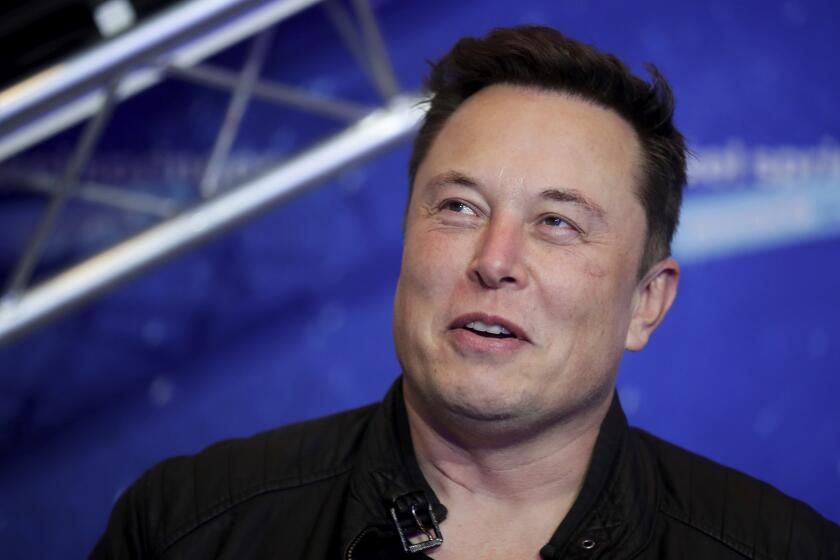An AI ‘gold rush.’ What to know about OpenAI’s record $40-billion funding round

- Share via
SAN FRANCISCO — ChatGPT maker OpenAI this week announced it had raised a whopping $40 billion as it races to dominate a competitive AI landscape against tech giants such as Google and rivals including Anthropic and Chinese upstart DeepSeek.
The investment was the highest ever raised for a startup and places OpenAI at a $300-billion valuation, tied with TikTok parent company ByteDance and behind the $350-billion valuation for Elon Musk’s SpaceX, according to research firm CB Insights.
“It’s a gold rush of epic proportions of gold rushes before,” said Ben Bajarin, chief executive and principal analyst at San José-based consulting firm Creative Strategies. “They’re not sitting on hoards of cash like Amazon, Microsoft and Google. … They have to raise that money in order to compete with those three companies and that’s what you’re seeing.”
OpenAI’s funding round shows how much investors are willing to pour into technology that has the potential to disrupt entertainment, healthcare, education and other major industries. The rising popularity of ChatGPT, released in 2022, set off a race among tech companies that could change how people work.
Elon Musk’s legal dispute against OpenAI could affect the future of one of the most prominent leaders in artificial intelligence.
The ability of AI-powered chatbots to quickly generate text and images has sparked concerns among some creatives over how AI models are trained and copyright holders are compensated. But tech companies have also pointed to AI’s potential benefits such as combating diseases and climate change.
Here’s what to know:
How does the deal work?
SoftBank said it plans to fund up to $30 billion of the $40-billion investment round and will syndicate no more than $10 billion to other co-investors.
SoftBank has the option to reduce its amount of investment to $20 billion if OpenAI does not change its business structure to a for-profit business by the end of this year, according to a person familiar with the matter who was not authorized to comment.
OpenAI began as a nonprofit in 2015 and later launched a for-profit subsidiary to oversee its commercial operations. The company is exploring changing the for-profit subsidiary to a public benefit corporation.
Elon Musk, who founded xAI, opposes OpenAI’s restructuring plan because he believes it veers away from the company’s founding principles and misleads investors. Meta also raised concerns about the transition, telling California Atty. Gen. Rob Bonta in a letter last year that it would have “seismic implications for Silicon Valley” because investors would have an incentive to launch organizations first as nonprofits and benefit from tax-free donations.
Elon Musk’s legal dispute against OpenAI could affect the future of one of the most prominent leaders in artificial intelligence.
What will OpenAI use the money for?
OpenAI said the funding will help the San Francisco-based company conduct AI research, release more powerful tools for the 500 million people who use ChatGPT weekly and grow its computing infrastructure such as data centers. People use ChatGPT to quickly generate text and images, search, brainstorm and complete other tasks.
“This investment helps us push the frontier and make AI more useful in everyday life,” OpenAI Chief Executive Sam Altman said in a statement.
SoftBank, which led the investment round, said it’s backing OpenAI because the company is the closest to achieving what’s known as artificial general intelligence. OpenAI describes AGI as “AI systems that are generally smarter than humans,” making it possible for people to get help with any tasks. SoftBank also cited an effort called Stargate that was announced with President Trump in January to invest $500 billion in AI infrastructure over the next four years.
About $18 billion of the investment round will go toward Stargate, according to a person familiar with the matter who declined to be named.
“Their support will help us continue building AI systems that drive scientific discovery, enable personalized education, enhance human creativity, and pave the way toward AGI that benefits all of humanity,” OpenAI said in a post announcing the funding round.
Bajarin said OpenAI will need to expand its infrastructure to power the use of its AI tools. After OpenAI released a new image generator in March that people used to turn themselves into Studio Ghibli-style characters, the startup warned of delays as it dealt with a surge in traffic.
How will this affect the race to dominate AI?
OpenAI still faces plenty of competition from rivals.
“No one knows who’s going to be the winner in AI, and it’s probably not one winner,” said Mike Gualtieri, vice president and principal analyst at Forrester, a research and advisory firm based in Massachusetts.
Rivals such as Google and Meta already gather a trove of valuable data on their users and have created apps used by billions of people, he said. Startups don’t always end up winning the race against their more established rivals. BlackBerry, for example, dominated the market with a device that paired a phone with a physical keyboard — until Apple introduced its groundbreaking iPhone with a touch screen.
OpenAI also faces competition from China, where startups such as DeepSeek claim they can compete against ChatGPT at a much lower cost.
“In order to compete with DeepSeek, you got to be better than DeepSeek, and they need this kind of money to do just that,” said Gene Munster, managing partner at Minneapolis-based Deepwater Asset Management.
It’s unclear whether the multibillion-dollar bets on AI’s future will pay off for investors, but infrastructure such as data centers is still a valuable asset for companies.
AI companies could make money from their models by striking business partnerships and releasing applications for consumers and businesses. “You need to get some data to be unique, to have some value, or they need applications,” Gualtieri said.
Jeffrey Wlodarczak, a principal and senior analyst at Pivotal Research Group, said he wouldn’t rule out ChatGPT as a big contender in the AI race against tech giants.
“The big question is … to win, do you have to spend the most?” Wlodarczak said.
More to Read
Inside the business of entertainment
The Wide Shot brings you news, analysis and insights on everything from streaming wars to production — and what it all means for the future.
You may occasionally receive promotional content from the Los Angeles Times.













